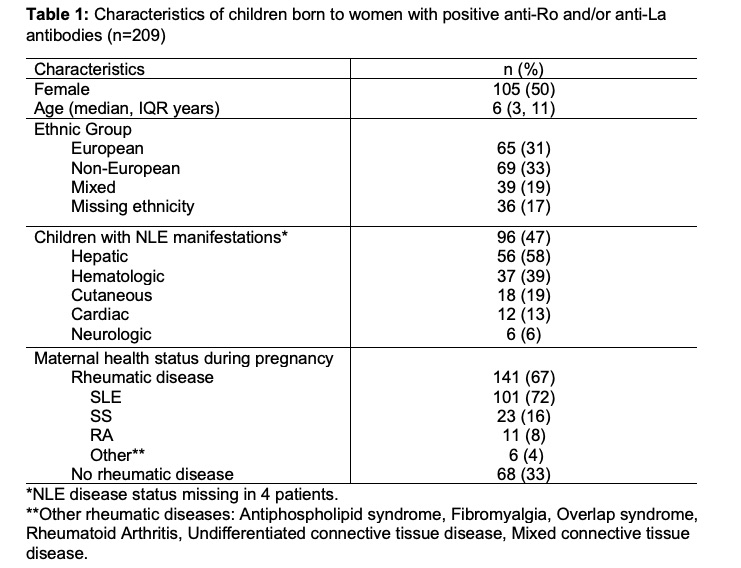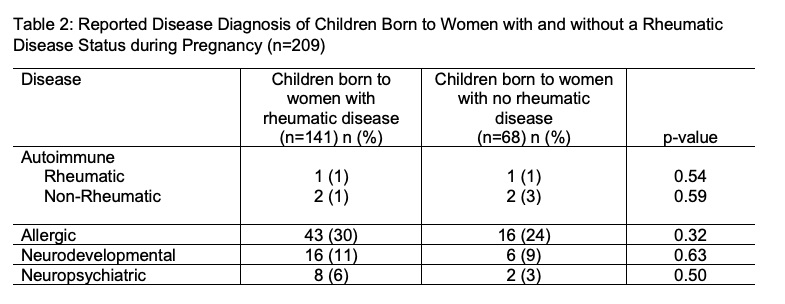Session Information
Date: Monday, November 9, 2020
Title: Pediatric Rheumatology – Clinical Poster III: SLE, Vasculitis, & JDM
Session Type: Poster Session D
Session Time: 9:00AM-11:00AM
Background/Purpose: Neonatal Lupus Erythematosus (NLE) is an acquired autoimmune disorder associated with the transplacental passage of maternal anti-Ro and/or anti-La antibodies. Previous studies have suggested that children born to anti-Ro/La antibody positive mothers with a rheumatic disease, might be at greater risk of developing autoimmune and non-autoimmune diseases, as children or young adults. The aim of this study was to determine the prevalence of autoimmune and non-autoimmune diseases in children born to anti-Ro/La positive mothers.
Methods: We conducted a cohort study of infants seen in the NLE clinic at SickKids Hospital between 1987-2019. Infants born to anti-Ro/La antibody positive mothers in the Greater Toronto Area were referred to the NLE clinic. Surveys were sent to those children discharged from the NLE clinic and consented to this study. We invited parents of patients ≥ 1y and < 18 years of age, and patients >18 y of age to complete a follow-up questionnaire via REDCap survey link. The survey included questions about autoimmune diseases such as rheumatic diseases (arthritis, connective tissue disease, vasculitis) and non-rheumatic diseases (psoriasis, thyroid disease, inflammatory bowel disease, type I diabetes), and non-autoimmune diseases such as allergic (seasonal allergies, anaphylaxis, asthma, eczema, urticaria), neurodevelopmental (autism, attention deficit hyperactivity disorder, global developmental delay), and neuropsychiatric diagnoses (anxiety, depression, tics, seizures, obsessive-compulsive disorder). NLE manifestations and maternal disease status during pregnancy were obtained from a dedicated database prospectively collected. Descriptive statistics were used for demographic characteristics and clinical features of NLE. Prevalence of autoimmune and non-autoimmune diseases were compared using Fisher’s exact test.
Results: We sent 354 surveys with a completion rate of 61% (n=217). Eight patients were excluded due to unconfirmed antibody status during pregnancy. We included 209 children born to 166 unique mothers. Median age at questionnaire completion was 6 years (IQR: 3,11), 50% female (Table 1). Forty-seven percent (n=96) of the children had NLE, and 67% (n=141) of the children were born to a woman with a rheumatic disease diagnosis during pregnancy. In our cohort, allergic diseases were the most frequent reported at 28% (n=59) and only 6 patients (3%) had developed autoimmune diseases. There was no difference in the prevalence of reported diseases/conditions between children born to a mother with or without rheumatic disease (Table 2).
Conclusion: In our multiethnic population of children born to women with positive anti-Ro and/or anti-La antibodies, there was no significant difference in the prevalence of autoimmune and non-autoimmune diseases between children with and without NLE manifestations, or born to women with and without a rheumatic disease during pregnancy. This is one of the largest cohort studies investigating long-term outcomes in this population. Continued recruitment of older participants will improve our ability to detect diseases with onset in young adulthood.
 Table 1: Characteristics of children born to women with positive anti-Ro and/or anti-La antibodies (n=209)
Table 1: Characteristics of children born to women with positive anti-Ro and/or anti-La antibodies (n=209)
 Table 2: Reported Disease Diagnosis of Children Born to Women with and without a Rheumatic Disease Status during Pregnancy (n=209)
Table 2: Reported Disease Diagnosis of Children Born to Women with and without a Rheumatic Disease Status during Pregnancy (n=209)
To cite this abstract in AMA style:
Diaz T, Dominguez D, Jaeggi E, Knight A, Laskin C, Ng L, Silverio F, Silverman E, Hiraki L. Long-Term Outcomes in Children Born to Anti-Ro and/or Anti-La Positive Mothers [abstract]. Arthritis Rheumatol. 2020; 72 (suppl 10). https://acrabstracts.org/abstract/long-term-outcomes-in-children-born-to-anti-ro-and-or-anti-la-positive-mothers-2/. Accessed .« Back to ACR Convergence 2020
ACR Meeting Abstracts - https://acrabstracts.org/abstract/long-term-outcomes-in-children-born-to-anti-ro-and-or-anti-la-positive-mothers-2/
